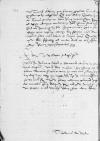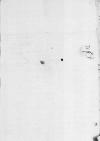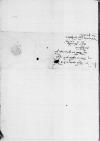Reverendissimo in Christo Patri et Domino, domino ⌊Ioanni Dei et apostolicae gratia episcopo Warmiensi⌋, domino et principi suo {suo} gratiosissimo
⌊Warmiae⌋ sive ⌊Heylsperg⌋ in ⌊Prussia⌋
⌊⌋ Reverendissimae Paternitatis Vestrae ⌊reverendissimo cardinali Sanctorum Quattuor⌋ directas diligenter, dum nuper in Augusto a ⌊pontifice⌋ vocatus ⌊urbem⌋ venisset, praesentavi iuncta commendatione accurata et diligenti. Qui ⌊⌋ lectis excusationem, quoad tempus expeditionis ecclesiae Culmensis, humanissime suscepit ac omnem operam in negotiis Reverendissimae Paternitatis Vestrae pollicebatur. Qua tamen tunc uti nequivimus, nam per unam dumtaxat in ⌊urbe⌋ perseveravit diem et mox mox rediit ⌊⌋, ubi ad decimam huius mensis substitit. Et cum iam in ⌊urbem⌋ reditum maturaret, ecce ⌊pontifex⌋ ⌊Anconam⌋ et divam Virginem de ⌊Loreto⌋ versus proficiscitur, voluitque reverendissimam dominationem suam viae et itineris comitem ita, ut ⌊urbem⌋ non inviseret, nam ⌊pontificem⌋ in itinere excepit et fortassis intra mensem in ⌊urbem⌋ non rediturus. Fama est ⌊pontificem⌋ ad Kalendas Novembris primum ⌊Romam⌋ rediturum. Et mihi quoque peregrinandum fuisset, nisi illustrissimi principis mei ⌊Ioannis Alberti marchionis Brandenburgensis⌋ praesentia me excusasset, quae me ad primum ver, licet secus constitueram, uti certe dubito, in ⌊urbe⌋ detinebit. Effecit igitur ⌊reverendissimi cardinalis⌋ praefati absentia, quominus ipsius opera in negotio commissionis, cuius exemplum dominus ⌊Gaspar⌋, Reverendissimae Paternitatis Vestrae nepos, mittit, uti potuerimus, tamen id, quod per nos obtineri potuit, signari curavimus, uti dubio procul praefatus dominus ⌊Caspar⌋ copiosius scribet. Attamen omnino spero et certe mihi persuadeo dominum ⌊Alexandrum⌋ sanis, piis et Christianis Reverendissimae Paternitatis Vestrae monitis et adhortationibus acquievisse ac differentiam illam concordia, compositione et pace sopitam sepultamque esse, quod Deus Optimus Maximus faxit.
Rerum novarum nihil, quam quod ⌊Turca⌋ et terrestribus et maritimis copiis Castellum Novum anno praeterito in nostram potestatem redacto oppugnavit et tandem vi expugnavit toto praesidio fortissimis, pro dolor, militibus demptis paucis occiso, et qui cladi superfuerunt ad trire
mes ⌊Turcarum⌋ condemnati. Quo facinore perpetrato ⌊Turcarum⌋ classis ⌊Constantinopolim⌋ rediisse dicitur. Est enim dictum Castellum quondam a ⌊Turcis⌋ structum in litore ⌊Illirici Maris⌋, supra ⌊Rhagusium⌋ ad XXX dumtaxat miliaria in ipso ⌊Catarensis sinus⌋ ostio. Quid autem immanissimus ille Christianis nominis hostis in futuram aestatem paret, nescimus. Attamen boni speramus nihil. Deus tamen Omnipotens suam nobis tribuat et largiatur gratiam. Quae Reverendissimam Paternitatem Vestram beet sospitetque ad multos annos, ex animo precor.



